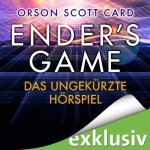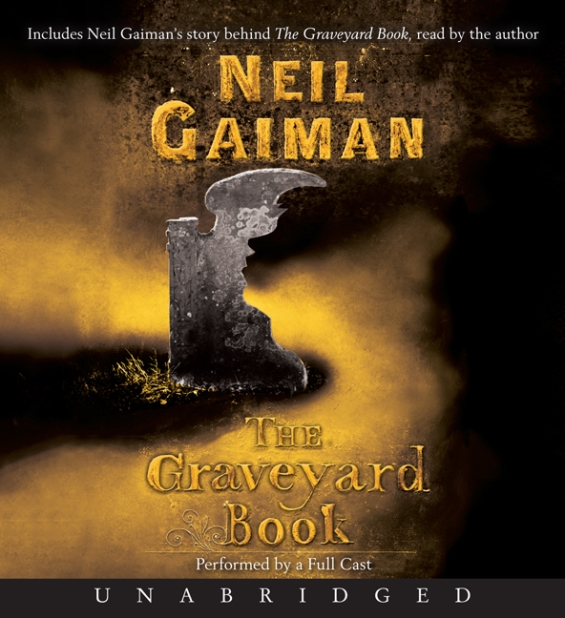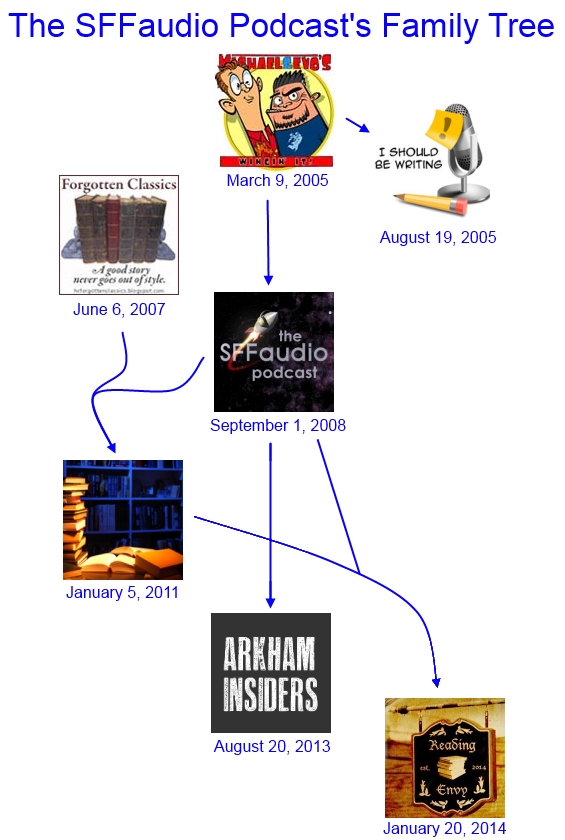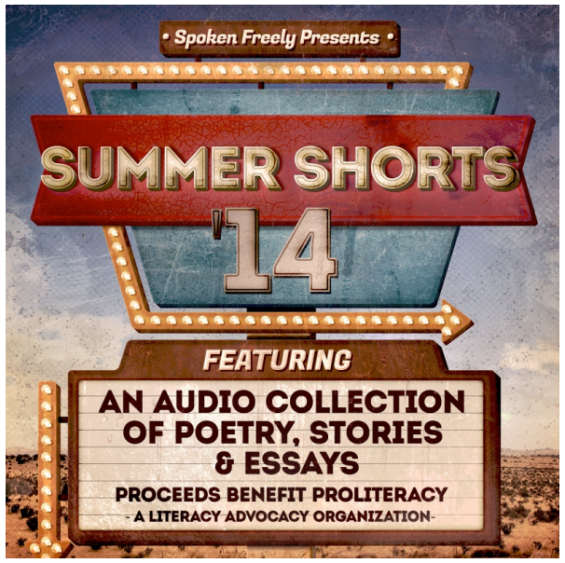
 Ender’s Game Als Ungekürztes Hörspiel
Ender’s Game Als Ungekürztes Hörspiel
By Orson Scott Card; Performed by a full cast
Audible Download – Approx. 8 hours [AUDIO DRAMA]
Publisher: Audible.de
Published: October 24, 2013
Much has been said about Orson Scott Card’s novel Ender’s Game from 1985 and there is still much to discuss. Of course there is much more than the ‘Oh, the titular game was real!’ ending. This ending may appear to be a very cheap solution to the reader today. But despite this, the novel’s implications are still delivering up-to-date topics for us to discuss. When the game was manipulated by the military and the kids had been hoodwinked into committing genocide against the Buggers – we can ask ‘what does that say about grown-ups manipulating kids in general?’ Orson Scott Card’s novel remains a classic SF because it constructs ideas within us.
To me this novel is a very particular story and after a long hiatus in the SF field I wanted to go back to the roots of my usual reading habits which used to be SF, Fantasy and Horror. I listened to the episodes of The SFFaudio Podcast and the name Orson Scott Card was sprinkled in here and there. In Cologne I went into an English bookstore named “Fine Tea and Books,” run by a very friendly guy named Christopher Potter – he also happens to be a Conan fan expert in recommending SF. He told me to read Orson Scott Card’s novel “Ender’s game” and so I did and I was immediately immersed into it.
Then I heard about a German audio drama, exclusively published by Audible. And then too I heard of an English language version. Orson Scott Card himself wrote the script for the show and it was translated into German by Andrea Wilhelm. A very experienced director of the audio drama, Balthasar von Weymarn (also well regarded as producer of the audiodrama company “Interplanar”). In addition von Weymarn is head of the Mythological RoundTable® Charter Berlin der Joseph Campbell® Foundation, and a screenwriter who no doubt knows his stuff.
Together with audio technican Jochen Simmendinger, von Weymarn had to coordinate 101 voice actors, including 40 child and teen voice actors at a recording studio in Berlin. The deadline was very tight because the German audio drama had to be released simultaneously with the start of the movie adaptatoion. The pressure was high but Baltashar von Weymarn loves challenges as he said “A challenge makes it fun.”
Von Weynarm is into the story and knows the novel well. A good director does not only consult the script, but researches much about the author and the cicrumstances around which the novel was written. Von Weynarm knows it all, he wonders why kids are trained that way, what kind of government rules Earth, and he goes deep into the story itself. And this hard thinking shows up in the production. The director’s interpretation of the audiodrama script, as well as of the novel, drives his imagination, evokes mind pictures that von Weynarm is able to explain to his actors. Perhaps every director has to work that way. However, Balthasar von Weynarm had to do it with 40 young and 61 adult actors, each one had to fulfil her or his part and the director had to explain how it all had to be done. This is an amazing achievement.
Due to the fact that the script was written by Orson Scott Card himself the director’s interpretation has it’s limits. But von Weynarm’s production maximizes the script’s power. There is no narrator. All “off-screen” information is given to us via comments by spectators of certain scenes. These spectators observe actions that are happening somewhere else and then anallyze these action right away. This is the issue director and his ensemble can show action. All that can be explained through the voice is well done. Music is also used, but shows up more between the scenes. And so as to fuel the listener’s imagination there are also addedsound effects, created by sound designer Tommi Schneefuss. Schneefuss does a terrific job because the sound effects are not intrusive nor too disturbing. They fit into the setting.
A special issue must have been the casting of the kid actors especially because there were strict specifications by the author. The central character Ender was played by 12-year-old Arne Kapfer. And because his mother was cast for this audio drama he was asked to join the cast. This is a tricky part in all audio drama productions, von Weynarm reports, because boys at that age can suddenly have their voice change. Arne Kapfer though is a pro himself, and brings in five years worth of experience as TV commercial actor. And at home his parents have their own recording studio. It was great to hear the development of Ender was transported through Arne Kapfer’s voice. His slight intonations toward sarcasm, in particular scenes in the Battle School, were very well performed. Kapfer brought in a lot of talent – though voice acting is only a hobby as he has career aspirations toward geology.
The producer of the audio drama is the Lauscherlounge company that works together with most of the best voice artists in Germany – many of whom t apper in “Ender’s Game.” Take for example one of my all-time-favourite voice actors Udo Schenk, who played Colonel Graff. Schenk is the voiceover artist for Garry Oldman, Ralph Fiennes, David Morrissey, Ray Liotta and many more. Timmo Niesner for Chamrajnagar (who dubs Elijah Wood), and Erich Rauker as Mazer Rackham (artist for Will Patton). Their talents form a neat audio drama that is both enjoyable and the very essence of the novel. Does this audiodrama replace the book? No, but it enlarges the listener’s understanding of the novel and it’s a whole lot of fun to hear. The seven hours pass almost too quickly.
Until recently the book itself was long out of print in Germany but because of the movie it was re-published in the general SF section of the Heyne Verlag and not marked out as a YA book.
Posted by Mirko








